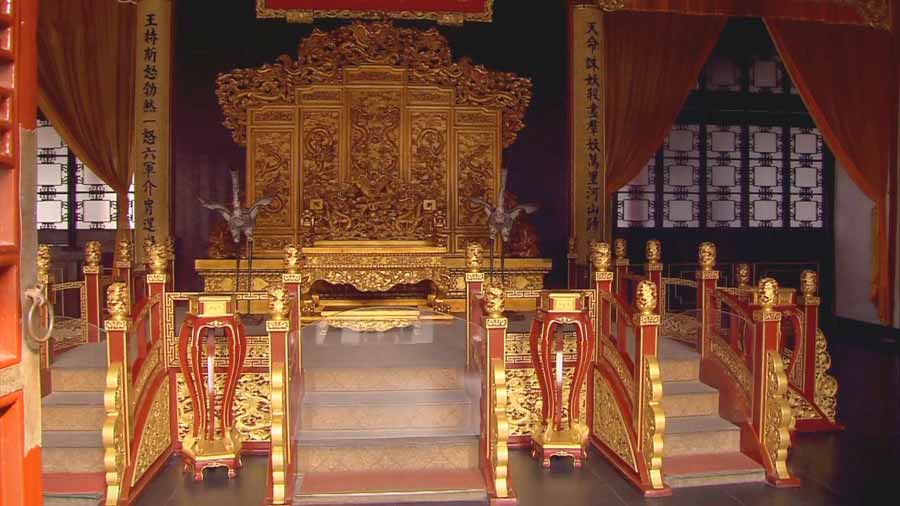The Story of China episode 6 – The Age of Revolution: Between 1850 and 1950, three cataclysmic revolutions shook China to the core, but out of them, today’s China emerged. ‘Revolution’, Michael Wood observes, ‘has been a fact of life in Chinese history’.
The film begins in Canton with the meeting of a US missionary and a Chinese student. Inspired by the Christian story and calling himself God’s second son, Hong unleashed the bloodiest war of the 19th century, the Taiping Rebellion. Wood heads into wild mountain villages in the south, where the revolution began.
As imperial China weakened, foreign influence grew. Treaty ports expanded, bringing growth and wealth, trams, railways and western sensibilities. But this provoked another surge of violence, the Boxer Rebellion, an attack against the foreigners, which was crushed by those same foreigners, who extorted a huge indemnity – $60 billion in today’s money.
The Story of China episode 6 – The Age of Revolution
Then in 1912, the empire fell, and many groups contested China’s future. In World War I, China sent 100,000 men to the western front, only to be humiliated at Versailles when German colonies in China were handed to Japan.
Between the two world wars, the disparity between rich and poor, city and countryside increased. We visit Hong Kong’s Peninsular Hotel in the jazz age and then follow Mao on the Long March to Yan’an, the heartland of revolution. World War II came to China two years earlier than it did in the west. Wood talks to a survivor of the Japanese massacre of Nanjing in 1937 and then charts the triumph of the communists, before ending the story with Mao’s death and the boom time of the last 30 years. The series ends with the warmth of the Chinese family and, at Beijing’s Altar of Heaven, a final haunting glimpse of eternal China.
Taiping Rebellion
The Taiping Rebellion, which is also known as the Taiping Civil War or the Taiping Revolution, was a massive rebellion or civil war that was waged in China from 1850 to 1864 between the established Manchu-led Qing dynasty and the Hakka-led Taiping Heavenly Kingdom.
Led by Hong Xiuquan, the self-proclaimed brother of Jesus Christ, the goals of the Taipings were religious, nationalist, and political in nature; they sought the conversion of the Chinese people to the Taiping’s syncretic version of Christianity, the overthrow of the ruling Manchus, and a wholesale transformation and reformation of the state.[8][9] Rather than simply supplanting the ruling class, the Taipings sought to upend the moral and social order of China. To that end, they established the Taiping Heavenly Kingdom as an oppositional state based in Tianjing (present-day Nanjing) and gained control of a significant part of southern China, eventually expanding to command a population base of nearly 30 million people.
Boxer Rebellion
The Boxer Rebellion, Boxer Uprising, or Yihetuan Movement was an anti-imperialist, anti-foreign, and anti-Christian uprising that took place in China between 1899 and 1901, toward the end of the Qing dynasty.
It was initiated by the Militia United in Righteousness (Yìhéquán), known in English as the Boxers because many of their members had been practitioners of Chinese martial arts, also referred to in the west as Chinese Boxing. Villagers in North China had been building resentment against Christian missionaries who ignored tax obligations and abused their extraterritorial rights to protect their congregants against lawsuits.
The immediate background of the uprising included severe drought and disruption caused by the growth of foreign spheres of influence following the Sino-Japanese War of 1895. After several months of growing violence and murder in Shandong and the North China Plain against the foreign and Christian presence in June 1900, Boxer fighters, convinced they were invulnerable to foreign weapons, converged on Beijing with the slogan Support the Qing government and exterminate the foreigners. Foreigners and Chinese Christians sought refuge in the Legation Quarter.
Nanjing Massacre
The Nanjing Massacre or the Rape of Nanjing, alternately written the Nanking Massacre or the Rape of Nanking, was an episode of mass murder and mass rape committed by Imperial Japanese troops against the residents of Nanjing (Nanking), then the capital of China, during the Second Sino-Japanese War.
The massacre occurred over a period of six weeks starting on December 13, 1937, the day that the Japanese captured Nanjing. During this period, soldiers of the Imperial Japanese Army murdered Chinese civilians and disarmed combatants who numbered an estimated 40,000 to over 300,000, and perpetrated widespread rape and looting.
Since most Japanese military records on the killings were kept secret or destroyed shortly after the surrender of Japan in 1945, historians have been unable to accurately estimate the death toll of the massacre. The International Military Tribunal for the Far East in Tokyo estimated in 1946 that over 200,000 Chinese were killed in the incident. China’s official estimate is more than 300,000 dead based on the evaluation of the Nanjing War Crimes Tribunal in 1947. The death toll has been actively contested among scholars since the 1980s.




